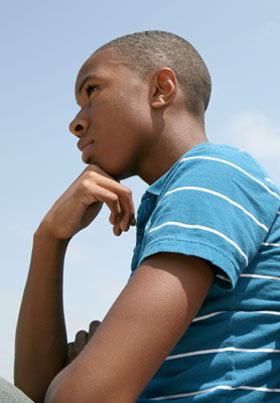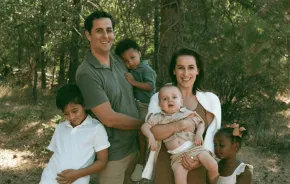 Betsy’s 9-year-old son just wouldn’t talk about the divorce. He was angry, and that rage sometimes surfaced at school. But around his mother and big sister? Not a word. Even his therapist met with stony silence. Betsy, a Bellevue resident, figured it was time to take action. So she invented “sketch book” therapy: “Once a week we’d have an hour to kill and I’d take ‘dictation’ from him,” she says. She’d start out by asking fun, trivial questions such as “What are your favorite TV shows?” and segue into “What are you worried about this week?”Eventually she got her son to talk — about TV, about his pets and about the upsetting fact that “Daddy doesn’t live with us anymore.”
Betsy’s 9-year-old son just wouldn’t talk about the divorce. He was angry, and that rage sometimes surfaced at school. But around his mother and big sister? Not a word. Even his therapist met with stony silence. Betsy, a Bellevue resident, figured it was time to take action. So she invented “sketch book” therapy: “Once a week we’d have an hour to kill and I’d take ‘dictation’ from him,” she says. She’d start out by asking fun, trivial questions such as “What are your favorite TV shows?” and segue into “What are you worried about this week?”Eventually she got her son to talk — about TV, about his pets and about the upsetting fact that “Daddy doesn’t live with us anymore.”
By finding a way to allow her child to express himself, Betsy is going a long way toward helping him adjust to the divorce, according to Carl E. Pickhardt, Ph.D., author of The Everything Parent’s Guide to Children and Divorce. “A child needs to speak up to express the thoughts and feelings that make up his or her inner experience,” he writes. “Talking out hurt feelings allows the child to identify and process what is emotionally going on, and enables him to feel acknowledged and supported.”
That’s the concept behind the “Family Changes” groups Elsbeth Ruder meets with during lunchtime at Island Park Elementary on Mercer Island. The students, grouped by age, gather weekly for 10-week sessions. “Many parents don’t realize how much separation and divorce impact their children,” says Ruder, a Mercer Island Youth and Family Services counselor. “The kids don’t always have a place to talk about it. They hear fighting and try to sort out what’s happening, but their brains aren’t developed enough to figure out what’s going on.” When they can’t make sense of what’s happening at home, it’s “harder to focus on that math problem,” she says.
In fact, it’s not unusual for signs of stress to show up in the classroom. “Kids can’t always say, ‘I did poorly on that history test because I’m worried about my parents,’” says Ruder.
John Ganz, an upper-school counselor at The Bush School in Seattle, says parents going through marital discord should watch for declines in their child’s school performance. These can be warning signs that things are not OK. “The first thing that begins to diminish with stress is cognitive ability,” says Ganz. “We’re asking kids to think — to be analytical, to problem-solve. When those begin to fall off the plate, we know that whatever is happening in that child’s life is having an impact.”
Parents and teachers should also watch for behavioral changes. “Kids get depressed, forgetful or angry; they might not cope as well as they did before,” says Ganz. “They may be accident prone or self-destructive, and their peer relationships can change.”
What kids worry about
In Ruder’s groups, the kids — who range from kindergarteners to fifth-graders — talk about finding ways to cope, Ruder says. “They’re very worried about seeming different from other kids and that kids will think poorly of them because their parents are divorced.”
What else do they worry about? How to deal with their parents’ arguments and whose job it is to stop them. Often, children think that role falls to them, says Jennifer Stoakes, a Seattle psychotherapist. “Kids think they can fix things,” says Stoakes. “They’ll look for ways to make this go away. If they can get their parents in the same room, they’ll sometimes grab both parents’ hands and try to link them together.”
Some kids feel they should be taking care of their parents, Stoakes says. “They assess the conflict and offer solutions.” They figure out — often on an unconscious level — that if they have behavior problems, their parents will have to work together. “That’s when you see things surface like eating disorders and bed-wetting,” she says.
What parents worry about
Parents often struggle to hide their own pain from their children. But the kids see right through that, says Stoakes. “Let’s say you’ve had a run-in with your ex. Then you go get your kids from school and you try to look cheerful. Your kids will pick up on that disconnect.” Kids “read” parents on many levels and can tell if there’s an inconsistency between what you’re saying and what you’re feeling, she says. “Better to say something like ‘Mommy’s having a hard day.’”
Not that parents should share every sordid detail. “That’s tricky territory,” Stoakes says. “It comes back to knowing your own child.” Try to strike a balance between clarity and common sense, she advises. Ruder, the school counselor, suggests sharing kid-appropriate information, but protecting them from “the nastier stuff and negative feelings.”
Dealing with those negative feelings takes skill, especially since your children (in most cases) need to have a relationship with your ex-partner. “Parents should realize that their kids see them as mom and dad. They don’t get that mom is mad at this ‘person’; she’s mad at dad — the one they love,” says Ruder. “It’s confusing, especially for younger kids. They’re thinking, ‘Why does mom dislike this person I love?’” That means not telling your kids what a rotten so-and-so your ex is. And that means not recruiting your child to Team Mom, or using him or her as a sounding board. “There’s often a lot at stake — custody issues, estate issues — and parents have their own agendas,” says Ganz. “They want the child to support their position; they give kids information that’s self-serving. It can be very destructive for the child.”
But with a measure of self-control, parents can put on that positive front, says Betsy, who regularly assures her children that their father’s a good guy. “I don’t believe it for a minute. But I feel the kids’ best shot at happiness in this life is to think their father is a good person.”
Linda Morgan is ParentMap’s associate editor and the author of Beyond Smart: Boosting Your Child’s Social, Emotional and Academic Potential.
Read part 2 of the series here.
Helping your kids cope with divorce
- Let your kids know their feelings are important and that they should feel free to express them.
- Find external support for yourself so you have the strength to act appropriately — and with control — in front of your children.
- Be positive in front of your kids, even when saying things like “Your dad wants to hang out with you this weekend.”
- Watch your children for signs of anger, sadness, anxiety or other red flags that might indicate they are having problems.
- Keep up an open, ongoing dialogue with your kids so they feel safe enough to tell you what’s bothering them.
- Understand that there will be changes in the parent/child relationship. Divorce can change a child’s view of who the parents are. If your child is struggling, provide him with an outside, neutral person to talk to.
From The Everything Parent’s Guide to Children and Divorce by Carl E. Pickhardt, Ph.D.









